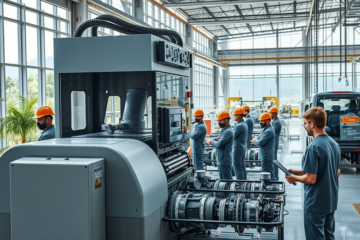Elon Musk Buys Tesla Shares With Vote of Confidence
Tesla shares have been a topic of great interest and controversy recently, especially following Elon Musk's $1 billion acquisition of shares.
This move not only resulted in a significant increase in the company's shares, but also raised questions about Musk's confidence in Tesla.
Furthermore, the proposed astronomical $1 trillion compensation plan for Musk, amid criticism of pay inequality, exemplifies the tensions between executives and employees.
In this article, we will explore the implications of this movement and the broader context of inequalities in the corporate environment.
Purchase of US$1 billion in Tesla shares and market reaction
Elon Musk's recent purchase of US$1 billion in Tesla shares has generated significant appreciation in the company's shares, with an increase of more than 8% during the auction.
This move not only attracted investor attention, but also underscored Musk's unwavering confidence in Tesla amid faltering demand for electric vehicles.
By using his own funds to acquire the shares, Musk sent a strong signal to the market about his future expectations for the company.
According to available information, this transaction was executed between prices of US$ 371 to US$ 396 per share.
The market response to this acquisition was instantaneous, reflecting Tesla's perceived stability and growth potential.
Among the reasons and immediate effects of this appreciation, the following stand out:
- Demonstration of trust by Musk, cementing his position as a visionary leader
- Positive investor reaction impacting Tesla's image
- Increase in market value, benefiting current shareholders
- Strengthening the perception of long-term sustainability of the company in the eyes of the market
For more information about the transaction, please contact Tesla at news link.
Why Direct Stock Purchases by Executives Are Unusual
Direct purchases of shares by executives, such as Elon Musk's recent significant acquisition of Tesla shares, are a practice remarkably unusual in the corporate market.
In general, executives prefer to use stock option plans, which offer them the possibility of acquiring shares in the future at a predetermined price, providing an economic benefit without the need for immediate outlay of equity capital.
This mechanism is advantageous for both executives and companies, as it aligns the interests of managers with those of shareholders, while at the same time minimizes personal financial risks.
However, Musk's decision to invest US$1 billion of personal capital in Tesla stock sends a unmistakable sign of confidence in the company's potential.
This atypical action creates a perception in the market that Tesla's leadership is strongly committed with the long-term success of the company.
As discussed in relevant articles, such movements not only instigate interest, but also reaffirm confidence in the company's strategic vision.
Elon Musk's fortune grows after stocks surge
Elon Musk saw his fortune grow substantially after Tesla's stock price rose, adding approximately US$1.4 billion to your assets.
This increase is due to the recent acquisition of shares in the company, which demonstrated a significant vote of confidence from Musk in his own business.
Market movement can be seen as a reflection of the direct impact that an increase in stock prices can have on the personal wealth of majority shareholders.
When the value of a company's shares rises, the net worth of individuals who own a significant stake also increases proportionately.
Musk is one of Tesla's largest shareholders, meaning any positive fluctuation in the stock price results in an increase in his fortune.
For more details on this market dynamic, access the analysis here.
Market confidence in Tesla is also boosted by strategic proposals, such as Musk's billion-dollar compensation plan, which highlights the company's continued growth potential.
US$1 trillion compensation plan and criticism of inequality
Tesla's trillion-dollar bonus proposal for Elon Musk marks a new high in corporate compensation packages.
O US$ 1 trillion It is intended for the CEO, linked to the achievement of certain goals, demonstrating the board's confidence in the continued expansion of the company's financial performance capabilities.
This offer illustrates Musk's appreciation for significant achievements, but it also raises questions about the allocation of value compared to the company's workforce.
The Pope expressed concern about exorbitant pay packages in a scenario where executives receive vastly higher sums than their employees, prompting action against growing inequality.
He highlighted that “…the difference between the values is alarming”, alluding to this context.
To illustrate, see the table below:
| Value | Reference |
|---|---|
| US$ 1 trillion | Expected remuneration plan |
| US$ XX thousand | Average annual salary of a Tesla employee |
The contrast between Musk's proposed salary and the average employee's salary highlights the disparity being criticized, highlighting a discrepancy that does not go unnoticed by critics of economic inequality.
In short, Elon Musk's recent moves and Tesla's compensation proposal not only highlight the stock's appreciation, but also bring to the fore debates about inequality in the corporate world.
These events make us reflect on the future of labor relations and the social responsibility of companies.



0 Comments